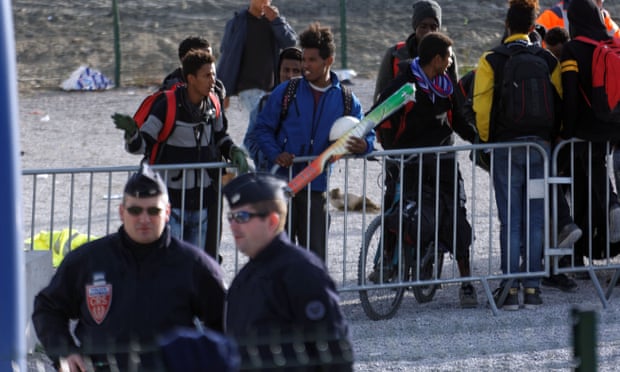Unaccompanied teenagers from Afghanistan, Yemen and Eritrea who had reached the Calais refugee camp will be barred from entering the UK according to Home Office guidelines.
In a decision that was condemned by refugee charities and campaigners, the move will limit the intake of teenagers who do not have family in the UK to those from Syria and Sudan except in exceptional circumstances.
The Home Office’s guidance said it would take children 12 or under of all nationalities, those deemed at high risk of sexual exploitation, and those who “are aged 15 or under and are of Sudanese or Syrian nationality” because people from those countries are already granted asylum in the UK in 75% of cases.
Lady Sheehan, the Liberal Democrat peer, said the new rules, details of which emerged on Tuesday night, were “unacceptable”. Sheehan said they would come as a “horrible shock” to refugees from other countries who had been led to believe they might be able to come to Britain. “It is quite arbitrary. We had no idea they were going to apply this sort of criteria,” she said. Sheehan said she feared that teenagers awaiting asylum decisions in reception centres across France would now escape and return to Calais to risk their lives jumping on lorries. “People will be just devastated,” she said in relation to some of the refugees she has campaigned for in Calais.
Rabbi Janet Darley, the leader of Citizens UK, accused the government of back-tracking on its promises. “The UK is unforgivably backtracking on its commitment to vulnerable refugee children in Europe. Citizens UK’s safe passage team estimates that around 40% of the children who were in Calais at the time of the demolition are Eritrean or Afghan,” said Darley.
“By ruling out children from these countries, the home secretary is arbitrarily preventing many vulnerable children from being helped by the Dubs amendment, and will make it impossible for her to keep her promise that the UK would take half of the unaccompanied children in Calais.”
The new guidelines were issued to Home Office staff on 8 November and have been seen by the Guardian after they were shared on Tuesday with charities which have worked in the Calais migrant camp. They follow claims by some tabloid newspapers that some of the youngsters coming to the UK were over 18. The Calais camp was demolished two weeks ago, with an estimated 2,000 children and young adults of 16, 17 and 18 years old now scattered across France in reception centres while their cases are examined by French and Home Office officials. The UK has so far taken about 330 children from the Calais camp.
Unaccompanied children who have a family member in the UK are currently allowed in as part of a “fast transfer” family reunification programme, mandated by EU lawe.
The remainder have no family in the UK, but qualify for entry under an amendment to immigration laws pushed through parliament by Lord Dubs earlier this year.
Citizens UK also said that the Home Office process of transferring children to the UK has virtually ground to a halt. A group of girls aged between 15 and 17 arrived in Scotland under the Dubs amendment at the weekend, but the charity has not been made aware of any others in the past week.
Of the unaccompanied minors who have been brought to the UK from France so far this year, about 250 are part of the “fast transfer” family reunification programme.
The chaotic clearance of the Calais migrant camp caused bitter tensions between the French and British governments, with France’s president telling the UK it had to do its “moral duty” and take 1,000 children from the camp.
The Home Office said that “all children who have close family in the UK will be considered for transfer” and those that do not have family ties would be assessed according to the new guidance. Fonte - Lisa O'Carrol - TheGuardian
E-BOOK GRATIS
SCARICA GRATUITAMENTE LA GUIDA PRATICA
I Minori Stranieri non Accompagnati
Migrant teenagers without family in UK barred except Syrians and Sudanese
Unaccompanied teenagers from Afghanistan, Yemen and Eritrea who had reached the Calais refugee camp will be barred from entering the UK a...








